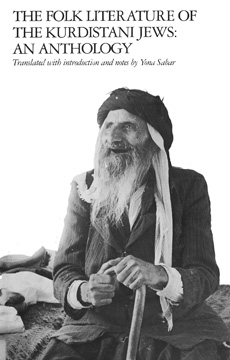|
PREFACE
The Jews of Kurdistan are unique in more than one way. They are considered one of the most ancient Jewish communities, tradition-ally tracing their origin to the first Israelite exiles taken away by the Assyrian kings. Until their emigration to Israel they were one of the most isolated Jewish communities in the world. Scattered in about two hundred villages in the rugged and almost inaccessible mountains of Kurdistan, they had very little contact with the rest of world Jewry. Yet in spite of their isolation and other adverse factors - such as general abject poverty, small and scattered communities, constant wars among the local Kurdish chieftains - this community maintained orally a unique wealth of ancient Jewish literary traditions embellished with themes from local Kurdistani folklore and daily life.
I have made an effort to include in this volume representative selections from the various genres of this literary heritage: epic re-creations of Biblical stories, Midrashic legends, folktales about local rabbis, Jewish and general Near Eastern moralistic anecdotes, folk songs, nursery rhymes, sayings, and proverbs.
I owe many thanks to Professors Judah Goldin and Franz Rosenthal, and to Dr. Leon Nemoy, for their encouragement in the various stages of this work. I am especially grateful to Dr. Nemoy for his painstaking editorial correction of my style and for his wise advice as to the type of selections to be included in the anthology. I am also grateful to Charles Grench and Sharon Slodki, at the Yale University Press, for their kind efforts and thoughts in making this volume as attractive in form as in content.
Among others who have assisted me are Professors Dov Noy and Aliza Shenhar of the Israel Folktale Archives, who very kindly made available to me the Archives' large collection of folktales of Kurdistani Jews. I am also much indebted to Dr. Stephen Stern, who prepared the motif index, and to the editors and publishers who gave me permission to include selections from their publications.
My wife, Stephanie, read the first English draft of each selection and assisted me in other aspects of this work, in addition to providing generous moral support.
Introduction
1. Kurdistan And The Kurds
I. The word Kurdistān in Persian means "the land of the Kurds." It seems to have been coined by the Seljuks, the Turkish dynasty that ruled the Near East between 1038 and 1194 C.E.,¹ but terms designating the Kurds or their land appear already in ancient times, going back as far as 2000 B.C.E. The Kurds are mentioned in Sumerian and Assyrian records, as well as in classical Greek and Latin works, particularly Xenophon's Anabasis (401-400 B.C.E.).² In Aramaic the region was known as betkardu, ³ and in the Aramaic translation of Onkelos (fourth century C.E.) the Biblical hare 'Ararat (Gen. 8:4), "the mountains of Ararat," where Noah's ark had rested, is identified as ture kardu, "the mountains of Kurdistan. "4 There are a few references to kardu and arduyyim in the Talmud (sixth century C. E.) as well.5
…..
1.Minorsky, pp.1130, 1140.
2.Ibid., p. 1132. Xenophon calls the area the country of the Carduchi"; see his Anabasis, bits. III—IV (pp. 97-170), which deal with the march of the Greek soldiers through Kurdistan and their fierce fights with the Kurds in the mountains. It is interesting that already Xenophon was impressed by the rugged nature of Kurdistan and the warlike character of the Kurds: "These people [the Carduchi), they said, lived in the mountains and were very warlike and not subject to the [Persian) king. Indeed, a royal army of one hundred and twenty thousand had once invaded their country, and not a man of them had got back, because of the terrible conditions of the ground they had to go through" (p. 127).
3.The spelling with A. suggests a Semitic etymology, "to be strong" (Akkadian); for this and other possible derivations (e.g., Persian gurd, "hero") see Minorsky, pp. 1133-34.
4.For other ancient sources of this tradition see Ginzberg, 5, 186; 4, 269: "On his return to Assyria, Sennacherib found a plank, which he worshipped as an idol, because it was part of the ark which had saved Noah from the deluge. He vowed that he would sacrifice his sons to this idol if he prospered in his next ventures. But his sons heard his vows, and they killed their father, and fled to Kardu, where they released the Jewish captives confined there in great numbers"; 6, 479: "Haman's son Parshandatha, who was governor of Kardunya, where the ark 'rested.'" A local tradition referring to the presence of the remnants of Noah's ark and altar on a local mountain ("Jabal Judi") is mentioned by various travelers; cf., e.g., Benjamin II, p. 94: "At the base of the mountain stand four stone pillars, which, according to the people residing here, formerly belonged to an ancient altar. This altar is believed to be that which Noah built on coming out of the ark [Gen. 8:20). They likewise assert that his remains are buried in the vicinity; they do not, however, specify the exact spot. I myself obtained several fragments of the ark which appeared to be covered with a kind of substance resembling tar."
5.Cf. B. BB 91a: "Our forefather Abraham was imprisoned for ten years, three in Kutha and seven in Kardu'; B. Yeb 160: "Proselytes may be accepted from among the Karduyyim." See also n. 4, above. |
